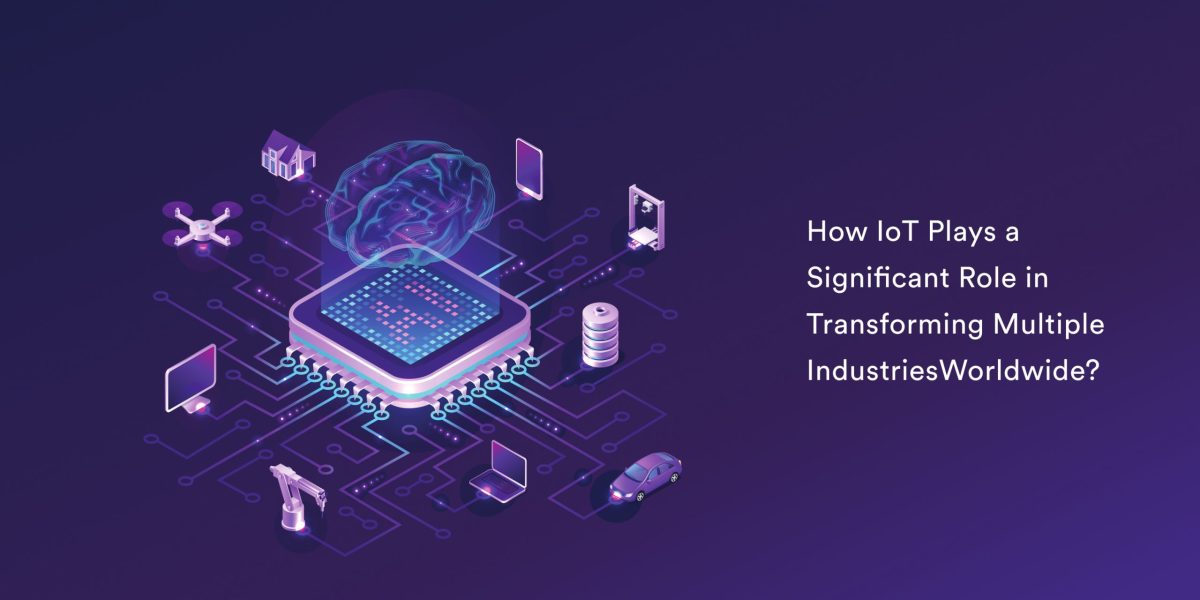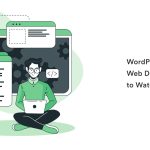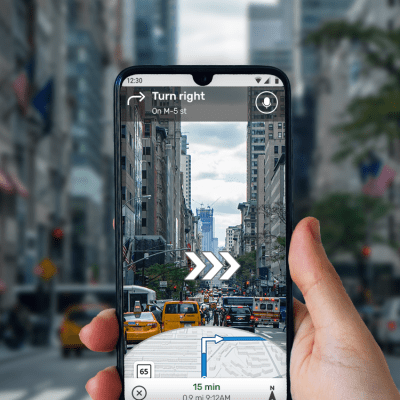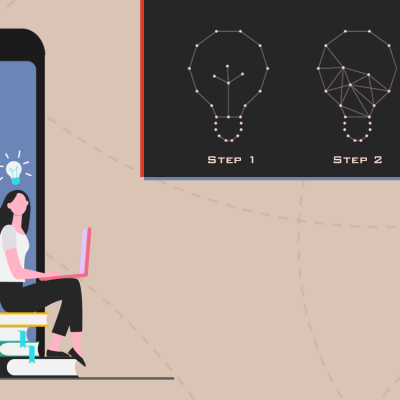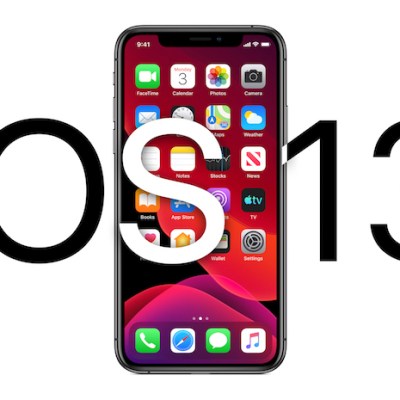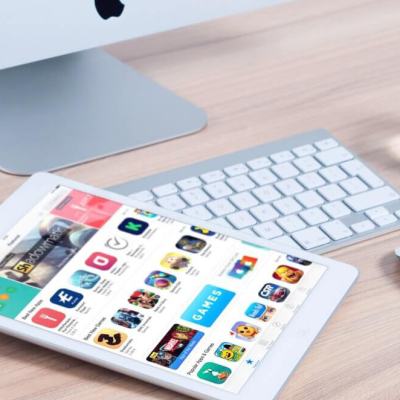IoT stands for the Internet of Things which connects billions of devices, things, or objects through a network and helps in getting things done effectively. It includes everything and anything from vehicles to home appliances, from devices to software, and enables exchanging data and easy interaction. It is a network of connected appliances which accumulate and share data through Internet technologies. This trend is being accepted worldwide and people are inclined more towards IoT app development.
According to Statista, the global market revenue of IoT is expected to grow by 1.6 Trillion by the end of the year 2025. It was marked 100 Million dollars in the year 2017.
IoT has disrupted multiple industries and majorly because of the great benefits it provides. Check out some of the Advantages IoT has to offer:
Benefits of Integrating IoT
1) Enhanced Customer Experience
IoT devices and connected appliances contribute a lot to improving the customer experience. It delivers personalized and interactive services to the users. IoT-powered sensors can provide real-time traffic updates as well as weather forecasts. IoT-based wearables provide real-time health monitoring.
2) Safety and Security
Safety and security are taken a notch higher by the organization with IoT solutions. It offers real-time monitoring and alerts and detects potential safety hazards with IoT sensors. It sends a notification to management and employees about the security hazard and helps take proper measures in time.
3) Data-driven Decisions
IoT devices help in generating a significant amount of data that is too accurate. This data can be analyzed properly and can be of great help in making important decisions. It helps gain data about operational performance, customer behavior, and other key metrics.
4) Improved Efficiency
IoT app development can help improve operational processes, automate different tasks, and streamline workflows. This will result in increased productivity and efficiency.
5) Cost-effective
IoT development can help in monitoring assets and equipment in real-time. Organizations can identify different issues and resolve them in a timely manner. It helps in resource utilization, energy monitoring, and savings, and ultimately helps in saving costs.
With all the above-mentioned benefits, industries across the globe are integrating IoT and taking the optimum benefit from it. Here is a list of industries that have accepted IoT development and benefiting immensely from it.
Use of IoT in Multiple Industries
1) Use of IoT in the Retail Sector
Retail is one of the top industries which has integrated IoT widely and loves the experience as well. IoT has immensely affected and altered the way retailers do business. Here are some of the best use cases of IoT in the retail industry.
- Inventory Management
There are IoT-enabled sensors and system that enables retailers to track product movements in real-time. It simplifies the process of managing inventory as retailers can identify which products are selling and which are not. This helps in deciding which stock to order next and which one to ditch. It can avoid stock over-storage as well as stock shortage. It also helps in managing the temperature level and humidity making sure the products stay fresh and avoid deterioration.
- Store Management
The IoT-enabled system makes it possible for retailers to manage various aspects of the store from one single panel. Say, for example, they can control lighting, security systems, and temperature, making sure the store is always up-to-date.
- Smart Shopping Carts
Keep track of customers’ purchase behavior and know what products are they buying, when is their purchase highest, and what offers are best suited to them with IoT-enabled shopping carts. This can not only improve customers’ shopping experience but also boost sales and increase conversion rate. It can also help in making data-driven decisions like deciding store layout, product placement, and many such things.
- Personalized Shopping Experience
IoT app development will allow the collection of data on the customer’s shopping list, choices, interests, and habits. All this data can be used to create a personalized shopping experience with relevant offers and customized product recommendations. This improves customer satisfaction and in turn, increases engagement and loyalty.
2) IoT in Manufacturing
Manufacturing plays a significant role in shaping the economy of any nation. With IoT in manufacturing, things have been more productive and lucrative. Let’s take a closer look at how IoT in the manufacturing industry is playing its role.
- Smart Factories
IoT sensors make it possible for manufacturers to monitor and control several things in the factory from one single control panel. Factory owners can automate various functions and get more output with less effort. IoT mobile app development for factories allows controlling multiple things remotely from any location. It can help track inventory, production, control lighting, and temperature from a single panel from any location.
- Predictive Maintenance
IoT systems can be used for real-time monitoring of equipment and machinery. It allows manufacturers to detect potential issues in advance and save the equipment and machinery from total failure. It also reduces downtime and ensures the longevity of the machinery and higher output. Knowing the potential troubles in advance, they can save cost, have timely maintenance, and improves equipment reliability.
- Supply Chain Management
IoT systems can be used for tracking products when they are supplied from the godown to the customer. This will ensure the safe delivery of the product with increased visibility and control. This will also eradicate delayed delivery and quality issues. IoT in the supply chain industry has definitely surged customer satisfaction with lowered costs.
- Energy Management
IoT development is also prevalent to monitor the use of energy in manufacturing and check for ways to reduce energy consumption Sensors can also be used to determine how much energy is utilized by which equipment and machinery and whether it is too old or defective and needs to be replaced.
- Water and Emission Management
IoT systems are of great use and can help in monitoring and controlling energy. It can also assist in decreasing the carbon footprint and reduce its impact on the environment. It also diminishes emissions and waste, making the operations sustainable and environment-friendly.
- Safety and Security
IoT application development also contributes heavily to adding safety and security to the manufacturing unit. If there is any fire in the manufacturing unit or leakage of gas, it will instantly start the alarm or turn on the lights if it is dark, or send alerts or notifications to the owner as well as the workers. It also sends notifications if there is entry of unauthorized persons on the premises.
3) IoT in Healthcare Industry
Healthcare is one of the industries which is using IoT solutions massively and has benefited both patients as well as doctors. Let’s take a closer look at the use cases of IoT in healthcare.
- Smart Hospitals
IoT solutions are the base for creating smart hospitals. Multiple tasks can be automated using motion sensors, contributing massively to patient care and delivering advanced healthcare facilities. Say, for example, smart lighting will adjust the lights of the room based on the outdoor lighting or the patient’s preferences. Smart beds will adjust according to the patient’s medical condition and can be adjusted according to the patient’s comfort.
- Asset Tracking
All the medical equipment and supplies can be tracked and made sure they are in the right place with IoT solutions. This will improve operational functioning and bring down the overall cost.
- Patient Monitoring
Every patient can monitor their health vitals remotely with IoT systems. This will reduce the in-person meeting and visits and also respond immediately in case of a health emergency. Smart wearable and glucose monitors work wonders for patients’ health monitoring.
- Smart Medical Devices
Connected medical devices are becoming very prevalent which allows collecting and transmitting data in real-time. This will improve patient care but also allow healthcare providers to take informed and better decisions about treatment plans. Say, for example, using a smart insulin pump will monitor glucose levels continuously and adjust insulin based on the data and eliminate the risk of hypoglycemia.
- Electronic Health Records
There are varied benefits of collecting and maintaining electronic health records. IoT will help a lot in this segment. IoT will manage electronic health records up-to-date and can be accessed in real-time from anywhere at any time by any health professional. Updates in the data can also be made quickly and easily. This reduces risks of committing errors and better and faster services.
4) IoT in Transportation and Logistics Industry
IoT in logistics and transportation has completely altered the way of business. Let’s take a look at how:
- Connected Vehicles
IoT-connected vehicles allow them to communicate with each other with the entire transportation network in real-time. It benefits the transport industry by increasing fuel efficiency, improving safety, and decreasing road congestion. IoT-embedded systems also monitor vehicle and keep track of their performance cut down on maintenance cost, and uplifts the vehicle’s work life.
- Fleet Management
IoT helps in monitoring the location of the vehicle and checking its condition in real-time. Installing sensors in the vehicle will allow tracking of their location, fuel consumption, and maintenance upkeep.
- Route Optimization
IoT solutions are best to optimize routes for delivery. Sensors are used for monitoring traffic conditions and adjusting routes in real-time. This will also cut short the delivery timing and make the customer happy and satisfied.
- Autonomous Vehicles
IoT integration allows autonomous vehicles to communicate with each other and with the entire transport network. Not just that it will help enhance performance, track the location, and increases safety and reliability.
- Logistics Management
IoT-embedded systems enable the logistic providers to keep track supply chain and get valuable insight into the whole delivery process. Drivers can optimize their delivery routes and make the delivery faster with reduced fuel consumption, carbon emissions, and improved efficiency. Real-time tracking also makes it possible to react immediately to any problems arising during the course of delivery.
- Enhanced Public Transportation
Transportation providers can access, control, and monitor their network in real-time with IoT-enabled devices. The number of passengers and their pickup and drop locations can be known and routes can be optimized accordingly.
5) IoT in Agriculture Sector
Agriculture is one of the most basic industries and one of those on which the world is entirely dependent. Now, let’s take a deep dive into how IoT is affecting and revolutionizing the agriculture sector.
- Precision Agriculture
With technological advancement in the agriculture sector, farmers can collect and analyze data on crops and livestock. This will help the framers to make data-driven decisions and improve work efficiency. IoT systems will assist farmers in checking the growth of crops and their health and also suggest any potential issues in the crop before it turns into massive trouble.
- Smart Farming
Farming can also turn to smart and farmers can take optimum advantage of it with IoT sensors. It can monitor soil moisture, temperature, and other environmental factors. This will help farmers in making better watering and fertilizing decisions and maintain an optimized schedule.
- Environment Monitoring
With IoT app development, farmers can have weather forecasts and plan their cropping accordingly. This will help minimize the environmental impact on farming activities. Sensors also work miracles in detecting soil erosion, tracking water usage, and checking air quality as well.
- Drone & Robotics
IoT enables robotics and drones are best to take efficiency a notch higher and cost a notch lower. It helps in surveying land conditions and applying pesticides and fertilizers. Also, robots can be used for harvesting and weeding.
- Livestock Monitoring
The Internet of Things can be used for checking and tracking the health and behavior of livestock which will, in turn, improve the well-being of the animals and also cut down on the cost related to injuries and sickness. IoT apps can check the temperature and activity of the livestock making farmers aware of the potential issues in a timely manner and quick redressal of the same.
Wrapping Up
So, which industry do you belong to? Whatever industry it is IoT has several benefits to offer. So, stop thinking and start developing a customized IoT solution for your business. Connect with a leading IoT app development company and get your solution ready.
